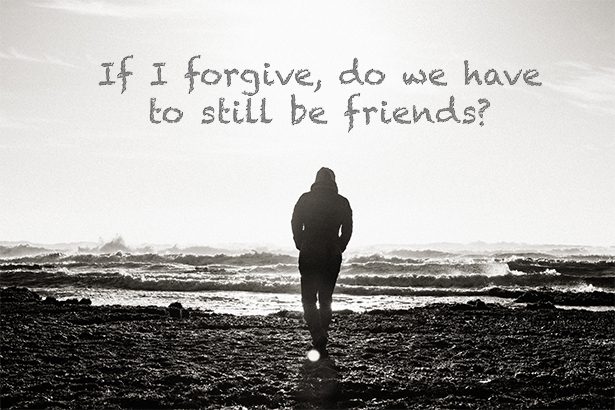Yes, we are expected to forgive endless times. Cultivating the habit of forgiveness makes life with others possible. But forgiveness is not necessarily linked to friendship or reconciliation.

Dear Thoughtful Pastor: I recently ended a friendship that had, in my opinion, become toxic and harmful to my emotional well-being. I have no doubt, whatsoever, that this was the right move and even necessary for my mental wellness, but ever since I cut off contact with my former friend, I’ve been recalling Bible verses about forgiveness, particularly Jesus calling His followers to forgive seventy-times-seven times, and instructions not to take communion without first reconciling with your brother.
My question is this: is it possible to forgive someone while also cutting off all contact? If so, what does that look like, and how does a Christian do that?
Pastors and theologians have long placed impossible burdens on their followers by insisting that “forget” goes with “forgive” and that forgiveness equals reconciliation.
Not true. Not biblical.
Certainly, Jesus spoke of reconciliation. Matthew 5 displays the high standards in kingdom of heaven living. Instead of, “Don’t murder” Jesus said, “Don’t be angry or even insult a brother or sister.”
So if (or when!) you have done these things and want to be accepted before God, go and make your sincere apologies and then return to worship.
A radically different scenario from disengaging yourself for your health from a toxic and damaging relationship.
Yes, we are expected to forgive endless times. Cultivating the habit of forgiveness makes life with others possible. But forgiveness is not linked to friendship or reconciliation.
The nature of forgiveness
A story in Matthew 18 illustrates the nature of this required forgiveness.
A king needed to settle accounts. One man owes the king an obscene amount of money. The debtor, totally unable to pay, throws himself on the mercy of the king. The king essentially says, “Oh well, what the heck. You don’t have to pay any of it back.”
The now debt-free man happily heads out and sees someone he knows who owes him a tiny sum of money. He grabs his debtor by the throat and insists on being paid. Immediately. When asked for mercy, he refused. The king, informed of this action, furiously hands over the original debtor to torture.
Jesus says, “So my heavenly Father will do to every one of you if you do not forgive your brother or sister from your heart.”
What happens when we forgive? We put down the need to take vengeance on the one who has offended. When we do that, we, the forgivers, become free. When we don’t, we put ourselves in prisons with impenetrable bars made of bitterness and ill-wishes against others.
In no place do we even see a hint of a suggestion that the one offering forgiveness must also offer trust, vulnerability, and reconciliation? The king doesn’t offer the original debtor more money, only release from what is owed.
Regaining trust is the responsibility of the offender, not a requirement for the forgiver
Rebuilding trust that leads to reconciled relationships puts all the responsibility on the offender, not the one who does the forgiving.
First, we acknowledge fully, without blaming the other, the nature of the offenses. No, “I’m sorry you are offended” statements or “I wouldn’t have done this if you hadn’t . . . “ stuff allowed. In other words, the debtor in the Matthew 18 story says, “Yeah, I borrowed all that money and I had no intention of paying it back.”
In other words, the debtor in the Matthew 18 story says, “Yeah, I borrowed all that money and I had no intention of paying it back.”
Second, we become accountable to others (not the offended) to take steps to correct the wrongs committed and the character issues underlying the wrongdoing. Note, I’m not talking about the everyday stuff that we all do to one another for which a simple apology suffices. I’m talking about consistent contributions a person makes to the toxicity of the relationship.
For this step, our Matthew 18 debtor goes to financial management classes, makes sure that all his financial transactions are totally visible to others, takes steps to pay the debt even after the forgiveness of it, and lives with integrity, grounded in truth. Perhaps he builds a business of his own, lends money to others, and deals with them graciously when things go wrong. Then, perhaps in five or ten years, he goes back to the king, repayment in hand, speaks words of deep regret and requests the possibility of entering into a trust relationship again.
But the king, even then, is under no obligation to do so should he sense that this would be an unhealthy or unwise move.
Each of us is ultimately responsible for the state of our soul health. Only the immature put that responsibility on the shoulders of others. Maintaining health may indeed mean ending relationships that are destructive.
Pay attention to your inner life. If you sense a relationship puts you in a death spiral, give yourself time and space to sort this out. See how you may be contributing, but do not be afraid to name the contributions of the other. If, after careful consideration and conversation, the relationship stays death-giving, disengage yourself.
Forget “forgive and forget”
A few words about the “forget” stuff. That’s just silly. If we forget past hurts, we’ll all keep putting our hands on hot stoves or continue to lick frozen pipes.
Pain has a purpose. Memories protect us from repeatedly making the same mistakes. When someone betrays your trust multiple times with no signs of true repentance and efforts at change, it is perfectly OK to remember the betrayals and remove yourself from the relationship.
Would you keep lending money to someone who persistently steals from you and you both know it? That’s just foolish.
We are called to be wise people, not ignorant or foolish ones. Routinely placing yourself in deliberate danger, whether that danger be physical, spiritual, financial, mental or social, is the definition of foolishness.
In no place in God’s word are we told to become doormats, passive receptacles for the dirt others don’t want to carry around with them.
You are made in the image of God, full of dignity. Treat yourself that way. No one else will until you start the process.
 [Note: a version of this column is slated to run in the March 17, 2017, edition of the Denton Record-Chronicle. The Thoughtful Pastor, AKA Christy Thomas, welcomes all questions for the column. Although the questioner will not be identified, I do need a name and verifiable contact information in case the newspaper editor has need of it. You may use this link to email questions.]
[Note: a version of this column is slated to run in the March 17, 2017, edition of the Denton Record-Chronicle. The Thoughtful Pastor, AKA Christy Thomas, welcomes all questions for the column. Although the questioner will not be identified, I do need a name and verifiable contact information in case the newspaper editor has need of it. You may use this link to email questions.]













